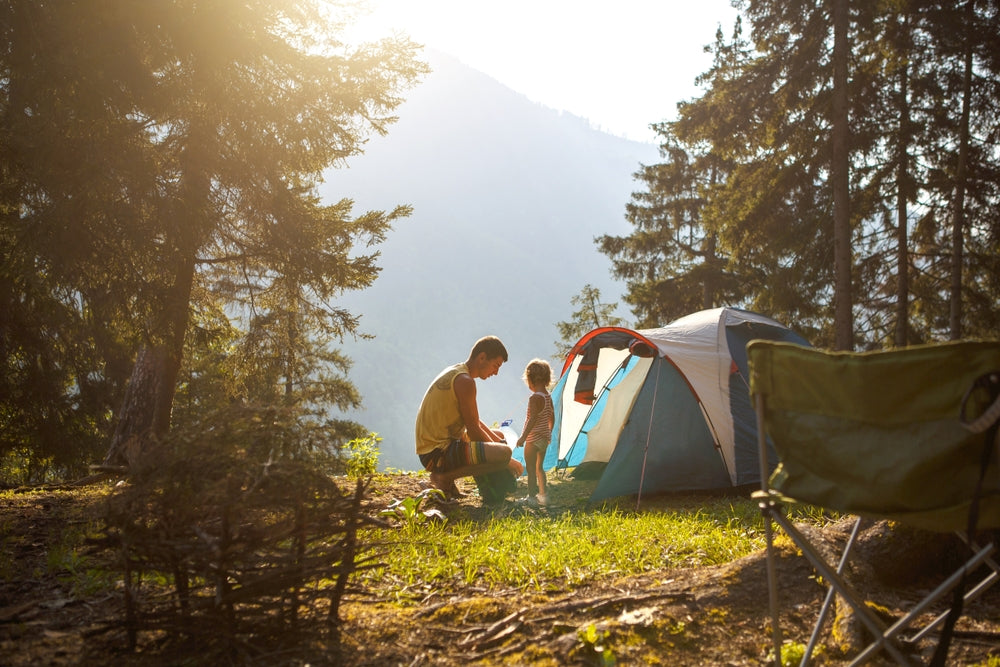Free U.S. Shipping On Orders Over $150

7 Tips to Make Your Hiking and Camping Adventures Eco-friendly
Posted on
Going into the great outdoors is fun and relaxing, whether you are hiking, backpacking or camping. But sometimes, we can leave these pristine places worse than we found them. From traipsing on delicate habitats to leaving plastics all over, your outdoor hobby could be worse for the environment than you think.
Luckily, it’s easy to enjoy the outdoors without causing much harm. Here are 7 tips to make your hiking, camping and any outdoor adventures more sustainable and eco-friendly.
1. Use a Reusable Water Bottle
Single use plastics are one of the biggest polluters in the world. Even if you are careful to dispose of your single use water bottle properly, it’s still bad for the environment.
Choose reusable containers to store your water when going outdoors. There are plenty of reusable water bottles designed specifically for outdoors. You can also use a water or hydration bladder or a large plastic jerry can if you need to carry a lot of water.
It’s not just your water bottle; check which other single-use plastics and items you can replace with reusable ones such as paper plates, disposable paper towels (use kitchen towels instead), plastic bags for food storage (use collapsible tupperware) and others.
2. Pack Eco-friendly Toiletries
Many of the toiletries we use — soap, lotion, sunscreen, toothpaste etc. — contain chemicals that can harm the environment and specific habitats. So be careful what you pack and how you use it.
Replace as many toiletries as you can with eco-friendly versions designed for use outdoors. For instance you can get marine-safe and biodegradable soap for use while camping. Natural and organic skincare products are also usually better for the environment.
But whatever you use, avoid getting it onto any delicate habitats, particularly aquatic ones. Even natural toiletries can be harmful for aquatic life.
You can also try cutting down on the amount of toiletries you pack. You don't need your entire skincare kit. Surely, you can go a few days without foundation or your hair mousse.
Consider not doing any laundry at all so that you don't need to pack any detergent. Pack clothes that you can wear multiple times. Clothes made with natural fabrics like wool and cotton stay fresher for longer.
You can also get Hercleon’s self-cleaning outdoor clothing like the HercShirt, Kribi underwear and HercSocks. They stay fresh and odor-free through multiple wears.
3. Choose a Less Traveled Destination
Over-tourism is a serious threat to local environments. Popular camping sites and hiking trails often get an overload of visitors, which destroys crucial habitats.
So see if you can find a less traveled campsite or trail. You can also choose to travel during the low season when there aren’t as many people.
4. Leave no Trace
If you get outdoors a lot, then you probably know about the 7 Leave No Trace Principles. They are all about minimizing the impact we have on the environment.
These principles include carefully choosing a campsite (e.g. only setting up at designated campsites), leaving the area as you found it (don't carry plants, animals or rocks away), respecting wildlife and disposing of waste properly.
Remember to pack a bag for waste. I recommend two bags: one for trash and another for recycling. You can also pack a third one for compost. If the campsite doesn't have a place to dispose of the waste, carry it home with you or to the nearest place where you can properly dispose of it.
5. Stay on Marked Trails
As part of ‘Leave No Trace’ it’s important to stick to marked trails. These are carefully designed to keep people out of delicate habitats and to avoid damage to plants and conflict with animals.
So don't get more adventurers than you need to be. And if you have a pet, make sure they also stick to the trails. If they are not well trained, keep them on a leash.
6. Switch to Clean Energy and Rechargeable Batteries
If you go camping with lots of gadgets that use disposable batteries, consider making the switch to rechargeable batteries. Disposable batteries do more environmental damage compared to rechargeable ones because they are used only once.
Also consider getting solar rechargeable gadgets such as lanterns and power banks. You can also get a small solar power station that keeps all your devices and gadgets charged.
7. Whenever Possible, Avoid Campfires
Obviously, don't light a campfire in areas where it is expressly forbidden to do so. But even if you are in an area where fires are allowed, it’s still a good idea to not light one. In addition to polluting the air, fires also harm the soil. You might also damage habitats when you collect wood for the fire.
Instead, use a portable fire pit, stove or grill to cook and get warmth.
Quick links
Contact
6063 Hudson Road #160
Woodbury, MN 55125
Yo@hercLeon.com
Leave a comment: